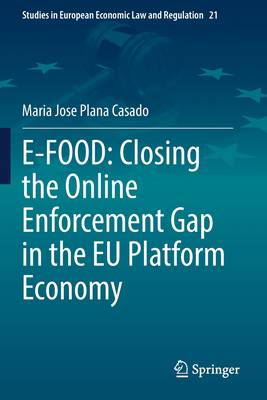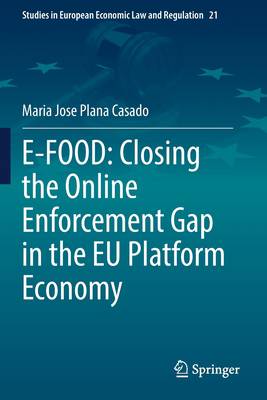
- Afhalen na 1 uur in een winkel met voorraad
- Gratis thuislevering in België vanaf € 30
- Ruim aanbod met 7 miljoen producten
- Afhalen na 1 uur in een winkel met voorraad
- Gratis thuislevering in België vanaf € 30
- Ruim aanbod met 7 miljoen producten
Zoeken
E-Food: Closing the Online Enforcement Gap in the EU Platform Economy
Maria Jose Plana Casado
€ 137,45
+ 274 punten
Uitvoering
Omschrijving
Retail is 'going digital, ' and grocery shopping is no exception. While some businesses are relaying on their corporate website to make the sale, both traditional brick-and-mortar and new disruptive business models are increasingly using online marketplaces to offer their products online. European Union law has been gradually updated to reflect this new reality, with Intellectual Property Rights legislation and Consumer Law leading the way toward a suitable regulatory framework in the Platform Economy. However, the EU has not devised a comprehensive strategy for tackling the challenges posed by the online sale of physical consumer goods, such as effective public enforcement in online environments. In fact, sector-specific legislation, including Food Law, largely ignores online transactions. In this context, the book evaluates the impact that online marketplaces are having on European Union sector-specific legislation and its e-nforcement. The goal is to assess whetherthe existing regulatory and policy framework are sufficient for promoting compliance and bridging the enforcement gap in the digital single market. Focusing on the e-food market, the book presents a state-of-the-art overview of how online marketplaces are altering EU law and its enforcement by public authorities.
Specificaties
Betrokkenen
- Auteur(s):
- Uitgeverij:
Inhoud
- Aantal bladzijden:
- 180
- Taal:
- Engels
- Reeks:
- Reeksnummer:
- nr. 21
Eigenschappen
- Productcode (EAN):
- 9783030795061
- Verschijningsdatum:
- 7/08/2022
- Uitvoering:
- Paperback
- Formaat:
- Trade paperback (VS)
- Afmetingen:
- 156 mm x 234 mm
- Gewicht:
- 281 g

Alleen bij Standaard Boekhandel
+ 274 punten op je klantenkaart van Standaard Boekhandel
Beoordelingen
We publiceren alleen reviews die voldoen aan de voorwaarden voor reviews. Bekijk onze voorwaarden voor reviews.











